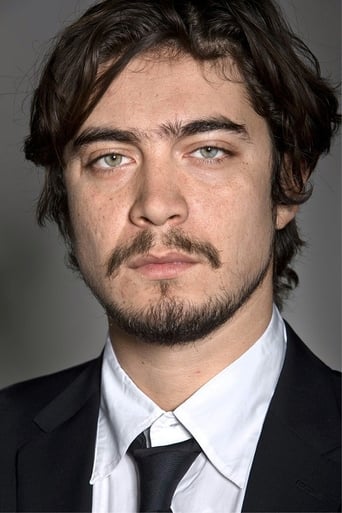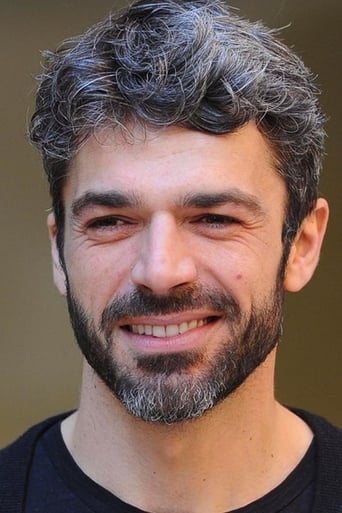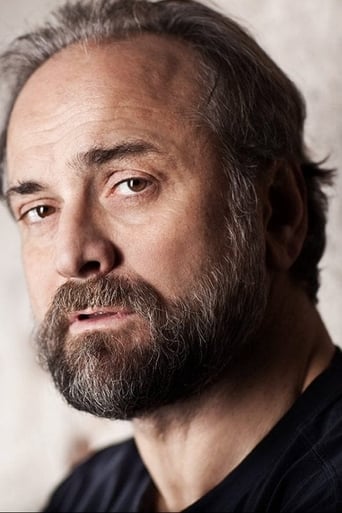UnowPriceless
hyped garbage
Kaydan Christian
A terrific literary drama and character piece that shows how the process of creating art can be seen differently by those doing it and those looking at it from the outside.
Taha Avalos
The best films of this genre always show a path and provide a takeaway for being a better person.
Cheryl
A clunky actioner with a handful of cool moments.
Julian Barbieri
I'm sorry to report that Michele Placido's "Il Grande Sogno" is a mess. It meanders from one predictable point to another even more predictable. Perhaps the most frustrating aspect is that Placido tries to pass on this pastiche as a serious personal memory. Nono of it clicks, everything looks and feels like a sentimental invention. Riccardo Scamarcio has an interesting face but he's just plain boring on the screen because I can't believe anything he says or does. Jasmine Trinca is a very special actress but she has a soap opera character to play. She gives it dignity and her effort is to be applauded but why, just tell me why Placido had to show her naked, a total full frontal in the most gratuitous fashion imaginable. Luca Argentero on the other hand is engaging and convincing and although I couldn't believe in his character I believed in him. "Il Grande Sogno" is a long, pretentious and altogether pointless film. Why was it in competition at Venice?
simona gianotti
It is difficult to make a movie on Italy's 1968, because so much has been said and filmed, and, although being still a fashionable subject, it risks getting much political interference, and being easily misunderstood, mainly in today's Italy. On the contrary, in this movie the director Michele Placido chose to reinterpret this historical period, appealing to his personal life, when he came from the South, as a son of the working class, to work as a policeman, but always cultivating the dream to become an actor. And the result is a mix between a social, historical movie, with pieces of documentaries from Vietnam, Martin Luther king, Che Guevara, Nixon, and a biographical recollecting of an intense period of the director's life, when he, a simple proletarian, became involved in the riots of the bourgeois university students, who wanted to subvert all the taboos and long-established values, in favour of a more just and free world. The greatest merit is that of presenting that period with all its contradictions and disillusions, as if the consciousness were always alive of the big chill that would replace the big dream of those enthusiastic days, since in the end many of those young revolutionary would convert to the extremist ideas of the terrible years when terrorism was at its height. The overall tone is of nostalgia (and an emotionally involving soundtrack contributes to it), together with some sense of disillusionment, as if nothing really changed so much, and the great ideals were easily abandoned in favour of something less idealistic. The actors are those of the moment: Luca Argentero, who, although made famous by the Big Brother, proves to be always fit for his role, Riccardo Scamarcio, who is still a long way from being a true actor, but here gives a convincing performance, and Jasmine Trinca who interprets with passion and truthfulness the role of the woman of those days.
Pierre-Paris2
Presented as an important recollection from one of the leading Italian filmmakers, Michele Placido but the truth is that "Il Grande Sogno" (The Big dream) is merely a TV movie with lots of pretenses. Using 1968 as the starting point for a personal epiphany is not merely provocative but also intriguing and exciting. Unfortunately what comes across is a parade of prototypes repeating slogans in a sadly uninspired telling of what feels like a false memory. Riccardo Scamarcio the golden boy of the moment confirms once more that he has, still, a long way to go before he becomes an actor to be reckon with. Luca Argentero, somehow, has an immediacy and a sympathy that makes it easier and more pleasurable to connect with. Jasmine Trinca is a lovely presence on the screen in a character who is very superficially drawn but that she manages to inject with some truth. Michele Placido must decide, sooner or later, what kind of director he wants to be. This was presented like a very personal yarn but feels just like a job. Sluggish and rushed. Very disappointing.
claudiaeilcinema
Michele Placido has been an constant figure in the Italian cinema for decades now. He directed one of my favorite Italian films of the 90's "Un Eroe Borghese" and starred in some glorious Italian titles of the last 30 years but he himself has gone the road of so many others, he has "practiced" his craft hasn't cultivated it. There is a palpable sense of pretension in his work, trying to be "important" that goes head to head with a deep seated personal, cultural ignorance. Here he indulges in some personal memories connected to the tumultuous 1968, isn't that convenient? But, as it happens to someone who has remain in the intellectual periphery of things, "Il Grande Sogno" doesn't serve us to understand his memory or his beliefs, if any. Riccardo Scamarcio, Placido's alter ego in this case, displays an element of truth, absent in all of his wort for the last few years but his intention as a character is as falsely profound as the film itself. The generational conflict that the period created remains at the threshold of a really compelling story. I loved Luca Argentero and Laura Morante. The film is bloated with self importance but empty from every imaginable angle. As if this wasn't depressing enough, at the press conference, Placido exploded when a journalist ask him how he, a committed left wing man made a film financed by the right wing Mediaset, he didn't have a rational answer of course instead a really childish one, plus, accused the journalist's country of invading countries, sending people to die and then making movies about it to appear good and decent. The statement was ignorant and ridiculous in itself but to make it worse was the fact that Placido launched the attack to the journalist thinking she was English when in fact she was Spanish. In a way the incident reveals what wrong with Placido's film.





